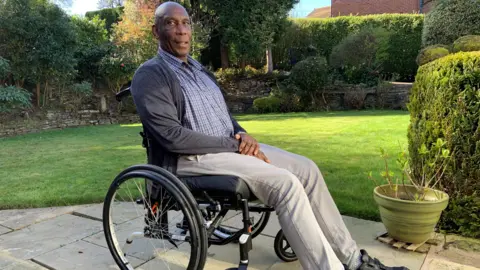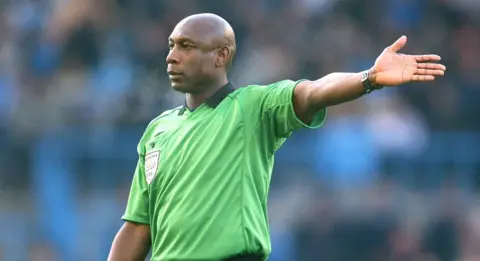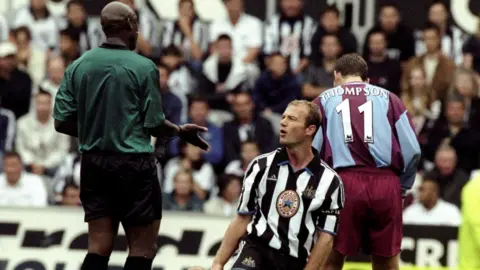The referee of the ex-premier Uriah Rennie “Learn to walk”

BBC News, Yorkshire
 BBC
BBCUriah Rennie has become a family face to millions of football fans after becoming the first black referee of the Premier League.
Once described as the official of the “most suitable” game in global football and an expert in martial arts, he is now learning to walk again after a rare condition has left him paralyzed from the life down.
After spending five months in the hospital, the 65 -year -old spoke with BBC News on rehabilitation, his combat spirit and a new brand new role.
Rennie, who officiated more than 300 top fixtures between 1997 and 2008, was on a birthday travel in Türkiye last year when it was hit by sudden back pain.
“I thought I had slept fun on a bed, I hoped to go in paragliding, but because of my back pain I couldn’t go,” he says.
“At the end of the holiday I couldn’t sleep a wink for pain, and when I went home I could barely walk.”
 Richard Sellers/Sportsphoto/Allstar/Getty
Richard Sellers/Sportsphoto/Allstar/GettyRennie made history in 1997 when he offered a game between Derby County and Wimbledon, becoming the first black referee of the best division.
High stature and a kick-boxing and an Aikido expert, protesting for players who quickly discovered that they are more comfortable in the ground during the discussions.
Magistrate in Sheffield since 1996, he has made a campaign for issues such as improving equality and inclusion in sport, supporting mental health and dealing with deprivation.
Rennie was about to start a new role as a Chancellor of the Sheffield Hallam University when he was admitted to the Northern General Hospital in October.
“I spent a month on the back and another four months sitting in bed,” he says.
“They kept me in the hospital until February, found a lump that pushed me on the spine and was a rare neurological condition, so it is not something they can operate on.
“I had to learn to move again, I’m looking back my legs.”
 St forster/Allsport/Getty
St forster/Allsport/Getty“It was strange: I went on to run for the city essentially in essence for so long.
“I had no previous back problems, but suddenly I was unable to move and I was in a spinal unit.”
Discussing his current movement, he says: “I can move my feet and I can be with a frame attached to the wheelchair but I have to work on my buttocks”.
Jokingly shows the wheelchairs on the Battiscopa tables around his home, with the physiotherapy that currently takes a large part of his day.
“I go around my chair doing my exercises, I am a very good and compliant patient,” he laughs.
“It was frustrating but the family and friends were precious, the hospital was absolutely superb and the university was exceptional.”
It officially begins as a university chancellor in May, a position that has been determined to assume despite its recent experiences.
“I stressed that I wanted to make a difference for Sheffield and for the communities here,” he says.
“I continued to work with sports teams of the community while I was in the hospital, directing them from my bed.”
He studied for an MBA at the University during his referee career and received an honorary doctorate in 2023 for his work with sports and local communities.
“I’m aiming to be the best I can physically,” he says.
“Nobody told me that I won’t walk anymore, but even if someone said that I wanted to be able to say that I did everything possible to try.”
Rennie, who moved from Jamaica to the United Kingdom as a child and grew up in the city’s Wybourn area, says that being the first black referee concerned “the creation of a legacy to allow other people to stay on the shoulders”.
Discussing his last challenge, he says that the compression of the spinal cord has given him a new vision of life.
“Many people are in a wheelchair, but don’t define them,” he says.
“He made me resistant and strong and I will never give up – I’m not alone, there is a village that helps me.”
He concludes: “I recognize how fragile things are in life now.
“I don’t know if I’m going to walk completely, but I know what I have to do to try and you must never give up hope.”





